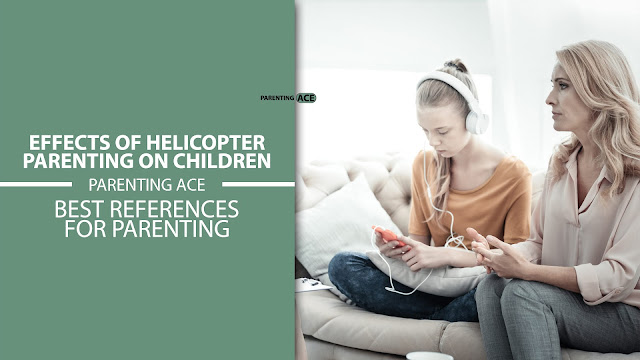Understanding the Potential Effects of Helicopter Parenting on Children
In the realm of parenting, the concept of "helicopter parenting" has emerged as a topic of considerable debate and scrutiny. This phenomenon, characterized by excessive control and overinvolvement in a child's life, has sparked discussions about its potential effects on children's development. As parents strive to navigate the delicate balance between support and autonomy, it becomes imperative to delve into the nuanced implications of helicopter parenting on children's emotional, social, and cognitive well-being. Join us as we explore the intricacies of this parenting style and its profound impact on the next generation.
 |
| Effects Of Helicopter Parenting On Children |
What Are The Potential Effects Of Helicopter Parenting On Children?
In recent years, the phenomenon of helicopter parenting has garnered significant attention in discussions surrounding child development and parenting practices. Helicopter parenting refers to a style of parenting characterized by excessive involvement, overprotection, and control over a child's life. While parents may have well-intentioned motives, such as ensuring their child's success and safety, the potential effects of helicopter parenting on children warrant careful examination. In this article, we delve into the intricacies of helicopter parenting and its possible consequences on children's emotional, social, and cognitive development.
The Nature of Helicopter Parenting
Helicopter parenting is marked by parents who hover over their children, constantly monitoring their activities, solving their problems, and shielding them from failure or discomfort. These parents tend to be overly involved in their child's academic pursuits, extracurricular activities, and social interactions, often micromanaging every aspect of their lives. While the underlying motivation may stem from a desire to protect and support their children, the consequences of such intense parental involvement can be far-reaching.
Impact on Emotional Development
One of the primary concerns associated with helicopter parenting is its potential impact on children's emotional well-being. Constant surveillance and intervention by parents can undermine a child's sense of autonomy and independence, leading to feelings of anxiety, inadequacy, and low self-esteem. Children raised in an environment where every decision is made for them may struggle to develop essential coping skills and resilience in the face of adversity. Moreover, the lack of opportunities to make mistakes and learn from failures can hinder their emotional growth and ability to navigate life's challenges effectively.
Effects on Social Skills
Helicopter parenting can also detrimentally affect children's social development. When parents constantly intervene in their child's social interactions and friendships, children may struggle to develop healthy peer relationships and communication skills. They may become overly reliant on their parents for social validation and approval, inhibiting their ability to form genuine connections with others and navigate social dynamics independently. Additionally, helicopter-parented children may exhibit difficulty in resolving conflicts and asserting themselves in social situations, as they have not been given the opportunity to develop these skills through firsthand experience.
Impact on Cognitive Development
In terms of cognitive development, helicopter parenting can hinder children's ability to think critically, solve problems, and make decisions autonomously. By constantly providing solutions and micromanaging tasks, parents deprive children of the opportunity to develop problem-solving skills and learn from trial and error. As a result, children may struggle with decision-making and lack the confidence to explore new ideas or take risks independently. This over-reliance on parental guidance can impede intellectual growth and inhibit creativity and innovation in the long run.
In conclusion, the potential effects of helicopter parenting on children are multifaceted and far-reaching. While parents may have the best intentions at heart, excessive control and overprotection can have detrimental consequences on children's emotional, social, and cognitive development. It is essential for parents to strike a balance between providing support and autonomy, allowing their children the space to learn, grow, and navigate the complexities of life independently. By fostering a nurturing yet empowering parenting style, parents can promote resilience, self-confidence, and healthy development in their children, laying the foundation for their success and well-being in the future.




